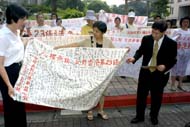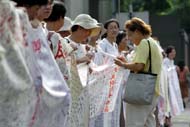(Clearwisdom.net) The Hong Kong government's pushing ahead with Article 23 legislation of the Basic Law is imminent. The "Global Coalition Against Article 23 Legislation" representatives in Taiwan went to Taiwan's Mainland Affairs Council on June 30 to deliver 50,000 signatures opposing the legislation. They hoped to convey to the Hong Kong government the Taiwanese people's opinions. Section Chief of Hong Kong and Macao Section Mr. Zhang Yongshan, representing the Mainland Affairs Council, accepted the signatures.
"Global Coalition Against Article 23 Legislation " representatives in Taiwan, lawyer Ms. Chu Woan-chyi (second from the left) and professor of journalism at the National Taiwan University Ms. Chang Chin-hwa (first from the left), delivered the statement and signatures to Section Chief Chang Yongshan (second from the right) from the Hong Kong and Macao Section of the Mainland Affairs Council.
On the afternoon of June 30, Ms. Chu Woan-chyi, Ms. Chang Chin-hwa and more than 60 members of the coalition went to deliver the statement and signatures to the Mainland Affairs Council, in hopes that the Hong Kong government would pay attention to voices from overseas.
Ms. Chu Woan-chyi expressed that the action of the coalition is to echo the July 1st March of 100,000 people in Hong Kong against Article 23 legislation. The coalition launched an island-wide signature collection drive on June 29, and within five hours, 50,000 people signed their names in support. It showed that Taiwanese people understand the incorrect nature of the legislation and oppose it.
She said that opposition to Article 23 legislation has become a global trend. The Canadian Foreign Affairs Ministry, the European Parliament, Chinese Human Rights Association, Taiwan, and U.S. Congress have expressed their opposition. The U.S. Congress passed Resolution 277 on June 26 with a 426 to 1 margin to oppose the Article 23 legislation.
Ms. Chu Woan-chyi emphasized that Hong Kong already has covering the "Seven Crimes" in Article 23, and the Hong Kong government does not need to enact Article 23 legislation. She said that China intends to undermine "One Country, Two Systems" through enacting Article 23 legislation, and intends to extend its totalitarian policies applied in Mainland to overseas. People with a sense of justice around the world should not accept such an act.
Many Taiwanese people travel to or do business in Hong Kong every year. Ms. Chu Woan-chyi said that if Article 23 were forcibly passed, the Taiwanese people's basic human rights in Hong Kong would be threatened. For instance, if one brings documents relating to Taiwan's independence to Hong Kong, the Hong Kong police could arrest the person and confiscate the document without a warrant.
Ms. Chu Woan-chyi called upon the Hong Kong government to safeguard freedom and human rights, and respect voices from the international community. She urged the Hong Kong government not to let freedom and the rule of law become accomplices for the Mainland's totalitarian rule, and be used to persecute people from democratic countries that are governed by the rule of law.
Ms. Chu Woan-chyi remains optimistic regarding the legislation's proposed passage on July 9. Facing pressure from inside Hong Kong and the international community, she did not believe that the Hong Kong government would forcibly implement the legislation.
More than 60 members of the coalition lined up at the entrance to the Mainland Affairs Council Building to display pieces of cloth with signatures and words, "Oppose violating human rights, oppose Hong Kong Article 23 legislation," "Support human rights, cherish freedom."
Falun Gong practitioner Ms. Cai, who participated in the appeal, expressed that it has not been long since Hong Kong was placed under the "One Country, Two Systems" policy, but Hong Kong is already facing the suppression of Article 23. She believed that the legislation targets Falun Gong practitioners in Hong Kong, and this would also deprive the people of Hong Kong's freedom of speech and belief. To put a stop to this, she stood up to support the people of Hong Kong.
Taipei citizen Ms. Zheng said that the Hong Kong government should not deprive the people of their freedom. She said, "In the future, the people of Hong Kong would have to be careful with their speech, and cannot talk freely." She usually travels to Hong Kong for two to three times every year to go sightseeing or visit friends and relatives. Once the legislation is passed, she would be unable to talk freely in Hong Kong.
All content published on this website is copyrighted by Minghui.org. Minghui will produce compilations of its online content regularly and on special occasions.













